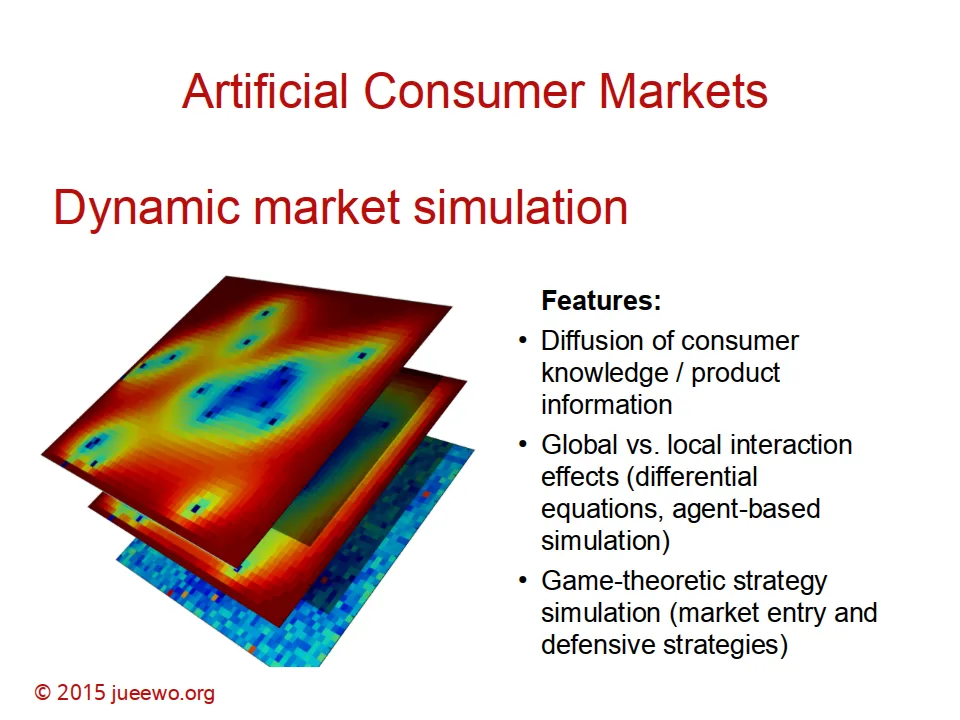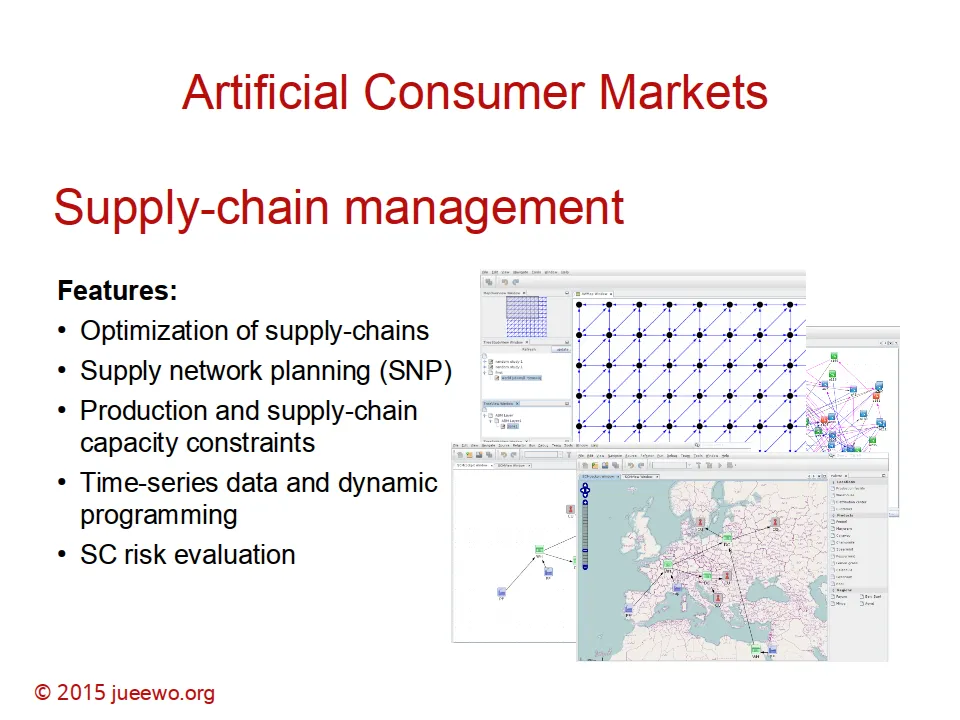Artificial Consumer Markets
The research project “Artificial Consumer Markets” is modeling the dynamic of business decisions in consumer markets. The research topics are covering a comprehensive range of strategic decision making, from product development to marketing and finance. focusing on dynamic interaction effects on markets. This approach allows the simulation of the trade-off between different (contradicting) strategic options and business decision.
Research Topics
- Market entry strategies (defender model, Hauser & Shugan)
- Diffusion of product information (word-of-mouth)
- Local vs. global communication effects (word-of-mouth vs. mass marketing)
- Optimal market entry and defensive strategy (game theory)
- Prediction Markets (Crowdsourcing - the wisdom of the crowd)


Features
Agent-based simulation
The core simulates the diffusion of consumer knowledge and product information. Global and local interactions are defining the optimal strategy.
Word-of-mouth
Communication is a relevant local effect to influence product perceptions. Different incentive structures are influencing the dynamic spread of knowledge.
Network effects
Network effects are essential for the interaction dynamic. Network structure and network formation processes are influencing the market dynamic.
Decision Support
The simulation output supports master planning and strategy optimization. The core model supports adaptive learning in applied information systems.
Publications
Journal Article:
- Wöckl, Jürgen. 2006. Modelling Artificial Consumer Markets. Simulation News Europe 44/45 39-40.
- Schuster, U., Wöckl, J.. 2005. Optimal Defensive Strategies under Varying Consumer Distributional Patterns and Market Maturity. Journal of Economics and Management, Vol. 1, No. 2, pp. 187-206.
Chapter in Book:
- Wöckl, Jürgen. 2009. Interacting Advertising and Production Strategies – A Model Approach on Customers’ Communication Networks. In: Agent-Based Approaches in Economic and Social Complex Systems V, Hrsg. Terano, T.; Kita, H.; Takahashi, S.; Deguchi, H., 143-153. Tokyo: Springer.
- Mazanec, Josef, Schuster, Ulrike, Wöckl, Jürgen. 2006. Defensive Strategies and Consumers’ Bounded Rationality: An Artificial Market Simulation. In Advances in Doctoral Research in Management, Vol. 1, Hrsg. L. Moutinho and P. Rita, 105-134. London: World Scientific.
- Schuster, U., Wöckl, J.. 2005. A Continuous-Time ACM Model and Experiment. in: Taudes, A. (ed.), Adaptive Information Systems and Modelling in Economics and Management Science, Springer, Vienna-New York 2005, pp. 45-56.
Conference Proceedings:
- Wöckl, Jürgen. 2007. Interacting Advertising and Production Strategies – A Model Approach on Customers’ Communication Networks. In AESCS 07, Hrsg. Takao Terano, 222-231. Tokyo, Japan: Agent-Based Social Systems / Sciences.
- Wöckl, Jürgen. 2007. Modelling Advertising and Production Strategies using Cellular Automata. In Proceedings of the 6th EUROSIM Congress on Modelling and Simulation, Hrsg. Borut Zupancic, RIhard Karba, Saso Blazic, 201-201. Ljubljana, Slovenia: ARGESIM / ASIM – Verlag.
- Wöckl, Jürgen, Taudes, Alfred. 2006. A Hybrid Approach to Modelling Advertising Effects – An Application to Optimal Lying in Software Business. In The First World Congress on Social Simulation, vol. 1, Hrsg. Takao Terano, 175-182. Kyoto, Japan.
- Schuster, U., Wöckl, J.. 2004. Optimal defense strategies under varying consumer distributional patterns and market maturity. AMS Annual Conference, vol. XXVII, pp. 140-144.
- Wöckl, J., Schuster, U.. 2004. Derivation of stationary optimal defensive strategies using a continuous market model. AMS Annual Conference, vol. XXVII, pp. 305-311.
